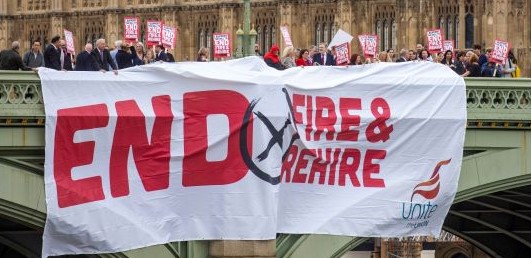Why workers need a strong union
I spoke today at the plenary session of Unite’s national equality conference. It brought together delegates from each of the union’s equality conferences taking place this week in Blackpool – women, BAEM, LGBT+ and disabilities, which are a cornerstone of our union and of our democracy.
These conferences are one of the most important aspects of Unite’s equality work, where policy is debated and campaign strategies set.
An opportunity to build participation of under-represented members in our equalities structures, in our union as a whole and in the wider labour movement.
Our purpose as a union is preserving and improving living standards, winning job security and standing up against injustice and inequality at work.
There is indeed so much to be proud of in Unite today. In one area after another we are leading the labour movement across Britain and Ireland.
We’ve not only advanced our own equality agenda but we’ve put it centre stage politically through the Labour Party.
Â
Optimism
It makes me so proud that all Unite’s equality policies were in Labour’s radical manifesto. A manifesto which represented hope, belief and, above all, optimism.
There were several key big commitments in the employment rights section, including our call for statutory rights for union equality reps.
This means that under a Labour government equality reps will no longer have second class rights and will have time to protect the people they represent.
Unite will be fighting all out for the early general election and Labour victory that can achieve the manifesto’s 20-point commitments for security and equality at work and which will really transform our prospects as a country, in manufacturing, public services, transport, construction, finance and energy alike.
The part Unite has played in bringing a radical progressive Labour party to the threshold of power, when most others doubted this was possible, is a tribute to our political strategy.
Our influence is acknowledged by all. Both through the Labour Party and directly we are the strongest voice for workers’ rights.
It’s notable too that equality monitoring of Labour’s 632 parliamentary candidates at the general election showed improvements in tackling under-representation.
This included the election and re-election of two former Unite equalities national committee members Marsha de Cordova and Kate Osamor, along with, among others, Laura Pidcock and Dan Carden.
Unite’s future candidates’ programme and the leadership training the equalities committees provide is undoubtedly having an impact on Parliament’s green benches, making them more representative of those they speak for.
But our political work is entirely bound to our industrial mission.
Just counting the many resolutions at the equalities conferences calling for legislation, or demanding the government does something, or stops doing something else, demonstrates that.
Advancing our demands depends very often on having a parliamentary majority and ministers sympathetic to our cause.
Jobs and investment
But it does not mean ignoring the present government. We will never let partisan politics get in the way of fighting for jobs and investment.
Just last week I met with the business secretary Greg Clark to tell him about my talks with the boss of the Ellesmere Port Vauxhall plant and what the government must do to secure long-term investment there.
And of course we discussed the Carillion scandal – the firm that built its business on reckless expansion, fuelled by debt and undercutting and wafer-thin profit margins, based on minimum pay for largely female workforces in many sectors, and the blacklisting of workers.
Last year was also a significant one for women, BAEM, disabled and LGBT+ people at work in the shape of the Supreme Court’s ruling that the Tory government was wrong to deny working people access to employment justice.
The abolition of employment tribunal fees was a victory for all workers, and particularly for equality and for the restoration of a semblance of balance in the workplace.
Fees allowed discrimination at work to flourish unchecked, a gift to bad bosses from the party which claims to be the friend of working people, but in reality turned its back on them.
Of course there’s a way to go yet in achieving greater equality in our members’ workplaces, just as there is for Unite’s own structures.
We know Unite must be representative of the workforce in order for us to strengthen organisation and build our union.
The importance of a widespread commitment to this cannot be underestimated and I welcome how our national equalities committees, organising with our industrial sectors and regions, are empowering their members to step up to leadership roles in their workplaces and branches.
Courage
Turning to the serious issue of workplace harassment I praise the courage of all people who speak out about the abuse they have suffered and pay tribute to the Unite equality and other reps who have been representing members, campaigning on harassment and giving a voice to victims for years.
Our union has strong structures which ensure we support members and that issues are dealt with fairly and industrially.
And Unite union education also plays an important role in ensuring dignity and respect at work and in our union.
Because we know that unionised workplaces, workplaces with strong unions based on the power of the collective, are safer workplaces.
The disgraceful events surrounding the Presidents Club dinner confirm what Unite’s own hospitality sector has long been tackling – this is the world so many of our members live and work in, day in, day out.
The preliminary findings of our hospitality member survey #notonthemenu are a damning indictment of an industry in which sexual harassment is endemic.
But of course as a union we have a duty to uncover the extent of the problem and to work with members and employers to find solutions.
This means negotiating dignity at work policies, living policies that set out a clear set of values and a zero tolerance approach to inappropriate behaviour.
It also means understanding what is propelling the rise in low paid, agency, zero hours and other forms of unstable work.
The sort of work our hospitality survey confirms is where the reporting of sexual harassment is especially difficult.
Without access to union reps, without a strong, collective voice in the workplace, workers will continue to lack confidence to complain, will continue to fear losing their jobs if they do.
Stronger union
That is why we need a stronger union, one from which we all benefit.
We know that under the Tories progress has been rolled back for women, LGBT+ and disabled people and BAEM communities.
Eight years of austerity, rising inequality, public sector cuts and the pay cap have hit women and ethnic minorities the hardest.
They want a different society, an end to decent secure jobs and affordable places to live are unobtainable for millions and where tax cheats go unpunished.
Stronger trade unions are vital to achieving these changes, not as an add-on to government, but as the very foundation of a more equal country.
History teaches us that working people only prosper when trade unions are powerful.
So by building a larger, stronger Unite, ready and able to put its full weight on the side of justice, we can play our full part in changing Britain and Ireland for the better.
For the many, not the few.
 Like
Like Follow
Follow


